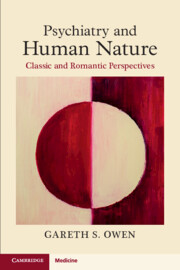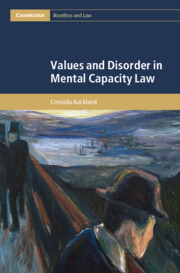Refine search
Actions for selected content:
46 results
Race and mental capacity: no panacea
-
- Journal:
- The British Journal of Psychiatry , FirstView
- Published online by Cambridge University Press:
- 13 November 2025, pp. 1-2
-
- Article
-
- You have access
- HTML
- Export citation
‘A little bit of empathy and compassion would go a long way’: emotional and psychosocial experiences of money management and cognitive decline in later life
-
- Journal:
- Ageing & Society / Volume 45 / Issue 12 / December 2025
- Published online by Cambridge University Press:
- 12 August 2025, pp. 2774-2796
- Print publication:
- December 2025
-
- Article
-
- You have access
- Open access
- HTML
- Export citation
Incapable of Managing His Estate: Habitual Drunkards and the Expansion of Guardianship in the Nineteenth-Century United States
-
- Journal:
- Law and History Review / Volume 43 / Issue 4 / November 2025
- Published online by Cambridge University Press:
- 14 July 2025, pp. 795-819
- Print publication:
- November 2025
-
- Article
-
- You have access
- Open access
- HTML
- Export citation
Chapter 10 - Mental Capacity
- from Part II - Psychiatry and Ethics
-
- Book:
- Psychiatry and Human Nature
- Published online:
- 03 May 2025
- Print publication:
- 22 May 2025, pp 133-144
-
- Chapter
- Export citation
Chapter 9 - Mental Capacity
- from Part II - Psychiatry and Ethics
-
- Book:
- Psychiatry and Human Nature
- Published online:
- 03 May 2025
- Print publication:
- 22 May 2025, pp 121-132
-
- Chapter
- Export citation

Psychiatry and Human Nature
- Classic and Romantic Perspectives
-
- Published online:
- 03 May 2025
- Print publication:
- 22 May 2025
Advance healthcare directives in psychiatry in Ireland: legal provisions, clinical challenges, and ethical issues in relation to self-harm and suicide
-
- Journal:
- Irish Journal of Psychological Medicine , First View
- Published online by Cambridge University Press:
- 20 March 2025, pp. 1-6
-
- Article
-
- You have access
- Open access
- HTML
- Export citation

Values and Disorder in Mental Capacity Law
-
- Published online:
- 25 October 2024
- Print publication:
- 27 June 2024
Chapter 14 - Dementia and Mental Capacity
- from Section 4 - Recent Developments/Contemporary Issues
-
- Book:
- The Neuropsychology of Dementia
- Published online:
- 25 October 2024
- Print publication:
- 17 October 2024, pp 165-178
-
- Chapter
- Export citation
Testamentary capacity
-
- Journal:
- BJPsych Advances / Volume 30 / Issue 6 / November 2024
- Published online by Cambridge University Press:
- 05 August 2024, pp. 377-382
- Print publication:
- November 2024
-
- Article
-
- You have access
- Open access
- HTML
- Export citation
16 - Defences/Grounds for Excluding Criminal Responsibility
- from Part IV - Substantive Law of International Crimes
-
- Book:
- An Introduction to International Criminal Law and Procedure
- Published online:
- 07 November 2024
- Print publication:
- 18 July 2024, pp 363-384
-
- Chapter
- Export citation
6 - Softening the Capacity Cliff Edge
-
- Book:
- Values and Disorder in Mental Capacity Law
- Published online:
- 25 October 2024
- Print publication:
- 27 June 2024, pp 226-272
-
- Chapter
- Export citation
Introduction
-
- Book:
- Values and Disorder in Mental Capacity Law
- Published online:
- 25 October 2024
- Print publication:
- 27 June 2024, pp 1-15
-
- Chapter
- Export citation
1 - A Value-Neutral Understanding of Capacity
-
- Book:
- Values and Disorder in Mental Capacity Law
- Published online:
- 25 October 2024
- Print publication:
- 27 June 2024, pp 16-36
-
- Chapter
- Export citation
Chapter 19 - Psychiatry in the General Hospital
-
-
- Book:
- Seminars in General Adult Psychiatry
- Published online:
- 04 April 2024
- Print publication:
- 18 April 2024, pp 739-766
-
- Chapter
- Export citation
Chapter 8 - Carers’ Needs before, during, and after Hospital Admissions
-
-
- Book:
- Handbook of Old Age Liaison Psychiatry
- Published online:
- 04 April 2024
- Print publication:
- 11 April 2024, pp 96-109
-
- Chapter
- Export citation
Decision making capacity for treatment in psychiatric inpatients: a systematic review and meta-analysis
-
- Journal:
- Psychological Medicine / Volume 54 / Issue 6 / April 2024
- Published online by Cambridge University Press:
- 04 March 2024, pp. 1074-1083
-
- Article
- Export citation
2 - Article 12 – Context and Background
-
- Book:
- Mental Capacity, Dignity and the Power of International Human Rights
- Published online:
- 03 August 2023
- Print publication:
- 17 August 2023, pp 32-73
-
- Chapter
- Export citation

Mental Capacity, Dignity and the Power of International Human Rights
-
- Published online:
- 03 August 2023
- Print publication:
- 17 August 2023
7 - The Proposed New Law on Advance Directives in Hong Kong: A Piecemeal Attempt at Codification?
- from Part II - Semi-regulated Jurisdictions
-
-
- Book:
- Advance Directives Across Asia
- Published online:
- 02 February 2023
- Print publication:
- 09 February 2023, pp 133-149
-
- Chapter
-
- You have access
- Open access
- HTML
- Export citation
